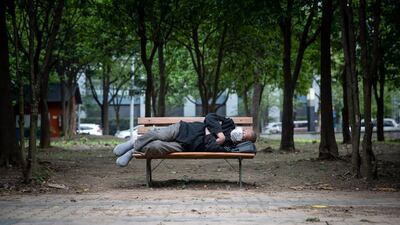Wuhan, the epicentre of the novel coronavirus outbreak in China, on Monday reported its first cluster of infections since a lockdown on the city was lifted a month ago, stoking concerns of a wider resurgence of the disease.
The new infections sounded a note of caution amid efforts to ease coronavirus-related restrictions across China as businesses restart and individuals get back to work.
Wuhan reported five new confirmed cases, all from the same residential compound. One was the wife of an 89-year-old patient reported a day earlier in the first confirmed case in the central city in more than a month.
"At present, the task of epidemic prevention and control in the city is still very heavy," the Wuhan health authority said.
"We must resolutely contain the risk of a rebound."
All of the latest cases were previously classified as asymptomatic, people who test positive for the virus and are capable of infecting others but do not show clinical signs such as a fever.
The number of asymptomatic cases in China is not known, as they only appear on the radar of health officials when they show up positive during tests conducted as part of contact tracing and health checks.
China does not include asymptomatic cases in its overall tally of confirmed cases, now at 82,918, until they exhibit signs of infection. Mainland China has reported 4,633 deaths.
Hundreds of asymptomatic cases in Wuhan, which was released on April 8 from a months-long lockdown, are being monitored.
The numbers of new cases reported in China since April have been small compared with the thousands confirmed every day in February, thanks to a nationwide regime of screening, testing and quarantine.
The government said on Friday that cinemas, museums and other venues would gradually be reopened, although restrictions including mandatory reservations and a limit on numbers of visitors would be in place.
The financial hub of Shanghai has reopened some night spots, and Walt Disney reopened its Shanghai Disneyland park on Monday to a reduced number of visitors.
New outbreaks in China in the past two months have mainly developed in residential compounds or at hospitals.
The national health authority called for stronger protocols at laboratories handling samples of coronavirus strains and human nucleic acid tests, and said tests should be carried out under appropriate laboratory settings.
Transport of samples and material that could be infectious must be strictly managed and accounted for, the National Health Commission said.
The news of new infections at the global ground zero came as many European nations begin the tricky task of navigating out of lockdowns imposed to halt the spread of the virus.
It also came as swathes of the US ease restrictions on movement – despite still rising rates of infection – and as citizens chafe under rules many say are government overreach.
The virus has now infected more than four million people worldwide, claiming more than 280,000 lives, and damaged the global economy.
The total number infected in China is around 83,000, with more than 4,600 dead.
No new deaths have been reported nationwide for nearly a month, with life in China gradually returning to normal after months of disruption.
More pupils returned to school in Beijing on Monday, weeks after senior high school students were allowed to return to campuses in the capital.
China has faced criticism at home and abroad for downplaying the virus and concealing information about the outbreak when it first emerged in Wuhan. Doubt has also been cast over the official toll.
Beijing has insisted it has always shared information with the World Health Organisation and other countries in a timely manner.













